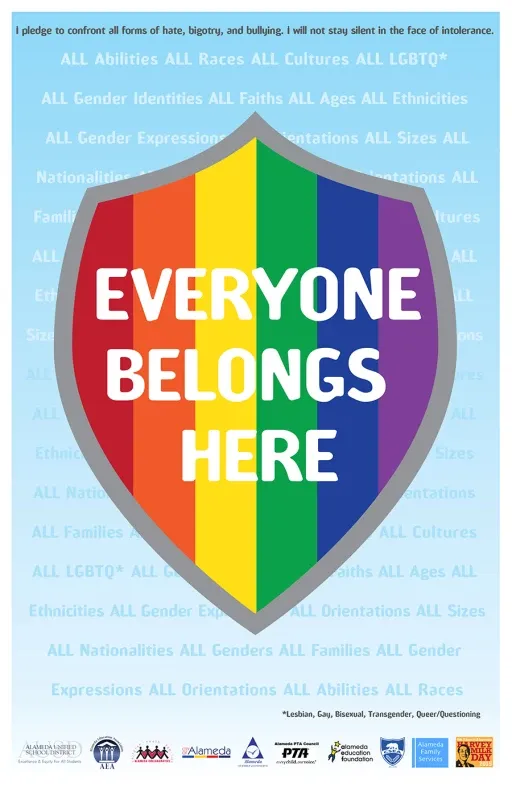Everyone belongs here: It's time to remove the remnants of Proposition 8

Nestled in the consent calendar on the Alameda City Council agenda for this coming Tuesday is an item that stirs some memories in my mind and perhaps others' across Alameda.
While weeding in our yard this Sunday, I popped in my "airbuds" and began listening to a 15 year old radio program. The recognizable theme music began ("a galloping, noodly mandolin composition") and then the equally recognizable voice of Michael Krasney, the now retired host of KQED Forum...
Las Vegas, 2008
As election results from around the country were coming in, the hotel ballroom in Las Vegas became more and more energized. I was hanging out near the back with some fellow Californians, simultaneously pleased to celebrate Barack Obama's landmark election as president and worried by the results coming from back home: the passage of Proposition 8.
While we were knocking on doors in the suburbs of Nevada over the previous weeks, tabulating clipboards' worth of paper lists into the "Voter Activation Network" website to hone the next day of canvassing (and to inform the lists of phone numbers provided to volunteers in call centers throughout the country), what had we forgotten to do in California?
From my vague memory, the warning signs had already been present. At some point leading up to that November, I recall my mom remarking on how surprised she was to suddenly see some yard signs in favor of Prop 8 appear in the placid inner Bay Area suburb where I grew up and where my parents still lived. She was also surprised to see bumper stickers in favor of Prop 8 start appearing on some minivans. In hindsight, maybe this inflection point was related to the Mormon Church's massive investment of resources into the campaign. But at the time, my mom and I — and the California progressives I was hanging out with in Las Vegas that evening in November 2008 — were surprised and horrified by such a mainstream acceptance of discrimination. How did so many seemingly normal people feel comfortable publicly expressing such specifically pointed bigotry?
After the election, with the experience of being a minor part of the major success of Obama's campaign, I looked for ways to help fight Prop 8 back home. I joined a local advocacy group in Santa Barbara, went down to WeHo for a voter outreach training event, read a lot of Courage Campaign newsletters... and probably stood out as a square cis straight white male at all these places... but still felt an obligation to try to provide a helpful hand.
Alameda, 2009
While I had no connection to Alameda at the time, it sounds like a similar post-Prop 8 reaction was happening here — that's what comes to my mind as I listened to this KQED Forum broadcast from 2009:

Recognizable names include then school board trustee Trish Herrera Spencer (the single vote against the anti-LGBT bullying curriculum) and then school board trustee Tracy Jensen (speaking in strong support of the curriculum and facing a recall election by opponents). Both currently serve on Alameda City Council. (Another recognizable name is John Knox White, who served a recent — and memorably productive — term on Alameda City Council.)
When I listen to the arguments on this talk show, I hear echos of the same questions that I recall from California in 2008 and 2009 and onward (until the 2015 Obergefell decision): "how could a majority of California voters harbor such ill will toward others who are just living their own lives?" and "so, what can we do about this?" — along with attempts on the part of the Prop 8 supporters at masking their own motivations.
There's talk about how all kids matter and all forms of bullying should be fought (which isn't wrong — it's just very deliberately side stepping the point, almost like the more recent "all lives matter" slogan).
Trish Herrera Spencer speaks critically about two male penguins in a book that may be read to Alameda Unified students.
More chilling to listen to in 2024 is when a local anti-LGBT advocate on that radio show in 2009 singled out the "T" — saying that the idea of transgender youth is the real problem with the adopted anti-bullying curriculum.
I wasn't here at the time, I was years from having a spouse or kids of my own or a school for them, and I don't want to make too many assumptions about the specifics in Alameda in 2009 — still, the tenor and the topics of this radio program felt oddly similar to what I recall as a childless 20-something in a different part of California in that same era.
2024
Proposition 3 is titled the "Right to Marry and Repeal Proposition 8 Amendment" and will appear on this November's ballot for all California voters.
It's overt goal is to "Trump proof" marriage equality in California. Should Trump and the Supreme Court change federal law, if Prop 3 passes this November, the California Constitution will no longer have the remnants of Prop 8 ready to re-activate. Just as ancient state-level abortion bans have reactivated, thanks to Trump's Supreme Court, state-level bans on gay marriage do also stand the risk of being reactivated.
The less overt — but equally important — goal of Prop 3 is to reduce the odds of a MAGA White House, Congress, and Supreme Court by encouraging as many Californians to vote in November as possible. Yes, we can expect Harris and Walz to handily win California's votes in the Electoral College. However, there are Congressional races across California that will play a part in deciding control of Congress. It's important to turn out as many progressive voters, liberal voters, centrist voters, fiscal conservative voters, and everyone else who agrees with basic freedoms such as the freedom to marry who you love.
Alameda city staff recommend that City Council adopt a resolution in support of Proposition 3. This item is under the consent calendar as agenda item 5-P. Unfortunately we can't take these freedoms for granted in 2024, so I trust that a majority of Alameda City Council members will adopt this resolution on Tuesday and that many Alamedans will vote with pride for Prop 3 in November.
